Carduus Benedictus, Blessed Thistle
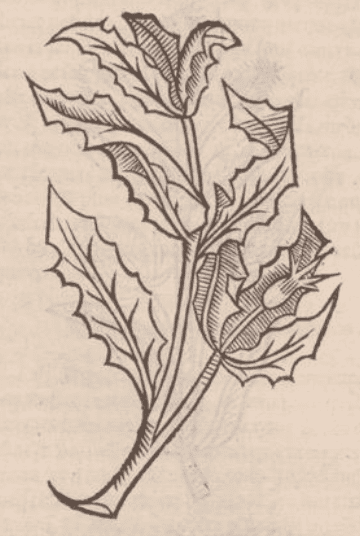 Ortus Sanitatis, Cube, Johann von, 1501
Ortus Sanitatis, Cube, Johann von, 1501
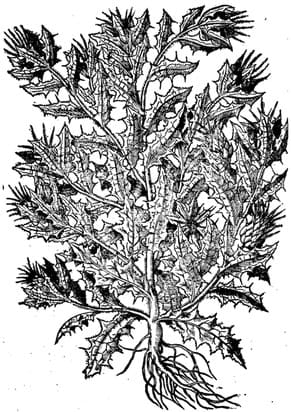
|
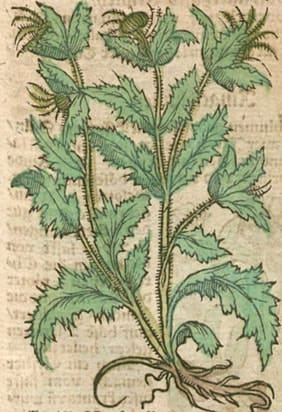
|
|
New Kreuterbuch, Matthiolus, 1563 |
Kurtzes Handtbuchlein, Ryff, 1599 |
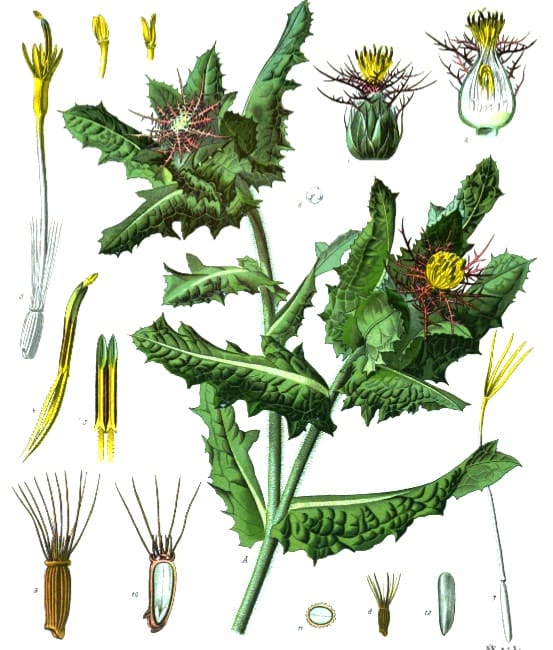 Koehler’s Medizinal Pflanzen, 1887
Koehler’s Medizinal Pflanzen, 1887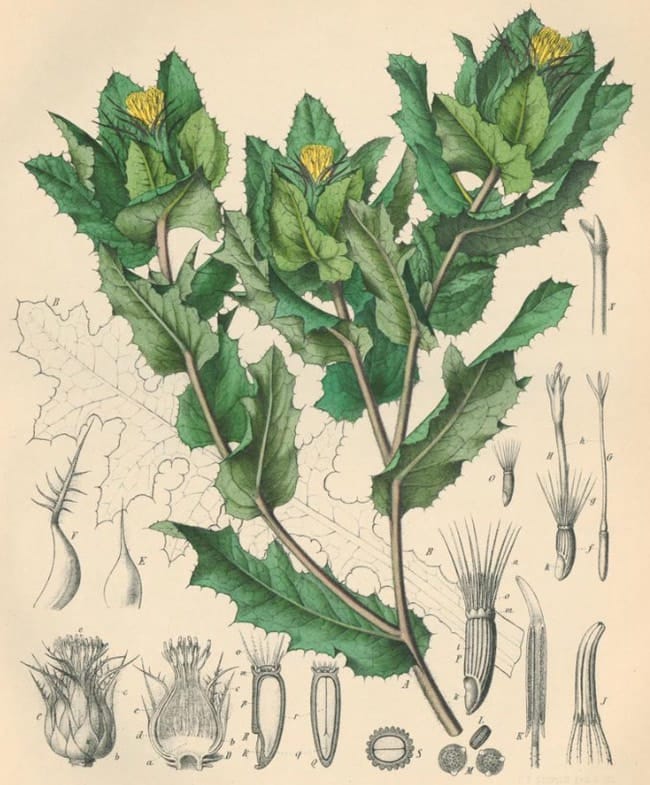 Atlas der Officinellen Pflanzen, Berg & Schmidt, Leipzig, 1893
Atlas der Officinellen Pflanzen, Berg & Schmidt, Leipzig, 1893Botanical name:
Carduus benedictus (syn. Cnicus benedictus, Centaurea benedicta)
Parts used:
Herb; Seed
Temperature & Taste:
Warm, dry. Bitter, pungent
attenuates, opens, discusses, and is cordial
Classification:
2F. PURIFYING
3A. SUDORIFICS & DIAPHORETICS. 3C. ALEXIPHARMIC. 3D. CORDIALS & CARDIACS. 3L. ANTI-TUSSIVE. 3M. ARTHRITIC
4c. CARDIAC. 4d. PECTORAL. 4e. STOMACHIC
Uses:
1. Clears Wind-Heat, Resists Poison, Promotes Sweat:
-Antidote; Preserves from and treats Epidemic and Infectious diseases
-Cold, Flu, acute Cough, Asthma, Allergies
-Fever, Eruptive Fever, old Fevers and Quartan Fevers; Plague, Syphilis
-venomous bites including Rabid Dogs
-Eczema, Sores, Boils, Itch
2. Clears Wind-Heat, Calms the Liver, stops Wind:
-Headache, Migraine, Epilepsy, Dizziness
-Madness, Insanity, Melancholy
–‘a singular remedy against Deafness’.
3. Clears Damp-Heat:
-obstructions of the Liver or Spleen
-Jaundice, Cholecystitis
-hot and painful urine
4. Clears Phlegm-Heat, Stops Cough and Wheezing:
-Cough, Wheezing, Asthma
-opens the Lungs and frees the Breath
5. Promotes Digestion:
-promotes appetite and strengthens Digestion (as a bitter)
6. Warms the Yang:
–strengthens the principle Organs (Brain, Heart, Liver, Stomach, Lungs and Kidney)
-often used to strengthen the Brain and Memory.
-strengthens the Back, tones the ligaments
7. Promotes Milk
-promotes and enriches Breast Milk
8. Kills Worms
-wine of Blessed Thistle is effective
9. Externally:
-poultice to sores and swellings
-externally to stop Gangrene (as a poultice)
–stubborn, indolent and gangrenous Ulcers
-foul and putrid Ulcers, especially of the Breast, sprinkle the powder on (Herbarium Horstianum, 1630)
Dose:
Powder: 1–3 grams (half–1 dram); 1 dram of the powder with wine for Epidemic disease
Decoction: 3–6 grams, up to 9 grams
Main Combinations:
1. A good way to use is to decoct Blessed Thistle with Raisin and Licorice (Decoction of Carduus); especially good for Cough, Asthma, Wheezing
2. Fever:
i. Quartan Fever, 1 dram of the powdered herb with wine (Herbarium Horstianum, 1630)
ii. Blessed Thistle with Centaury and Wormwood
iii. Blessed Thistle with Centaury, Sorrel, Chicory, Dandelion, Licorice (Kroeber)
3. Antidote against Wind-Cold infection: Blessed Thistle with Scordium, Elecampane, Zedoary, Myrrh, Juniper berry
4. Asthma:
i. Dustilled Water of Blessed Thistle taken morning and night benefits Asthma (Herbarium Horstianum, 1630)
ii. Blessed Thistle with Horehound, Pimpinella, Knotgrass
iii. Blessed Thistle with Licorice, Raisins, Coltsfoot
5. Cholagogue:
i. Blessed Thistle with Wormwood, Peppermint, Dandelion
ii. Blessed Thistle with Gentian, Camomile
iii. Blessed Thistle with Gentian, Centaury, Camomile, Orange peel, Nutmeg, Clove (Fuller)
6. Inflammations, Blessed Thistle with Elder flower, Peppermint, Ginger
7. Diarrhea, Blessed Thistle with Agrimony, Tormentil
8. Epilepsy:
i. decoction or Wine of Blessed Thistle taken morning and night (Herbarium Horstianum, 1630)
ii. half dram of powdered Blessed Thistle with Linden Water (Herbarium Horstianum, 1630)
iii. or Apoplexy, Blessed Thistle with Angelica, Zedoary, Bistort, Gentian, Balm, Sandalwood, Clove
9. Loss of Memory, decoction of the herb and seed strengthens Memory (Herbarium Horstianum, 1630)
Major Formula
Bitter Decoction
Purging Bitter Decoction
Decoction to Promote Appetite
Syrup of Balm (Fernelius)
Electuary of Elecampane (Unani)
Tincture Against Asthma
Tincture for Suppressed Menstruation
Powder Against Toxicity and Venom (Wecker)
Cautions:
Some have said it shouldn’t be used in Pregnancy
Main Preparations used:
Distilled Water, clarified Juice, Spirit, Distilled Oil, Conserve, Syrup, and an Extract
1. Extract of Blessed Thistle:
i. fresh Blessed Thistle, any amount. Pound in a stone mortar, adding a little water, then press and evaporate to the consistency of an extract.
ii. Blessed Thistle (2 lbs.), Cold Water (20 lbs.). Macerate 24 hours, stirring, and strain. Set aside, and evaporate to an extract.
iii. Blessed Thistle leaf, any quantity, boiling water, sufficient. Infuse, strain, then evaporate to an extract.
2. Syrup of Blessed Thistle:
i. Juice of Blessed Thistle, depurated and reduced to half (18 oz.), White Sugar (32 oz.). Make a Syrup. (Dispensatorium medico pharmaceuticum Palatinatus, 1764)
3. Tincture of Blessed Thistle:
i. Blessed Thistle herb (4 oz.), Alcohol (2 lbs.). Steep, press, strain, then add more Blessed Thistle (2 oz.). Digest several days, then press and filter. Dose: 1 dram in wine. (Pharmacopoeia Wirtembergica, 1798)
4. Distilled Water of Blessed Thistle:
i. Bruised Blessed Thistle herb (1 part), Water (2 parts); distil two-thirds. (Pharmacopoeia Sardoa, 1773)
Click the Tabs above for more information on this Medicin
GENERAL /. REVIEW:
–The constituents and pharmacology of Cnicus benedictus-A review
ANTIBACTERIAL:
–HPLC/ESI-MS Characterization of Phenolic Compounds from Cnicus benedictus L. Roots: A Study of Antioxidant, Antibacterial, Anti-Inflammatory, and Anti-Alzheimer’s Activity.
–[Constitution and antibiotical properties of the essential oil of Cnicus benedictus (author’s transl)].
–[Antibiotic and cytotoxic activity of cnicin isolated from Cnicus benedictus L].
–The antimicrobial activity of the Cnicus benedictus L. extracts
–Antibacterial Activity of Ethanolic Extract of Roots of the Blessed Thistle (Cnicus Benedictus L.)
–Antibacterial activity of ethanolic extract of leaves of the blessed thistle (Cnicus benedictus L.)
ANTI-INFLAMMATORY:
–HPLC/ESI-MS Characterization of Phenolic Compounds from Cnicus benedictus L. Roots: A Study of Antioxidant, Antibacterial, Anti-Inflammatory, and Anti-Alzheimer’s Activity.
–Properties of antioxidant and anti-inflammatory activity and phenolic profiles of Şevketi Bostan (Cnicus benedictus L.) cultivated in Aegean Region from Turkey
–Anti-inflammatory activity of Ethanolic extract of Cnicus Benedictus
ANTIOXIDANT::
–HPLC/ESI-MS Characterization of Phenolic Compounds from Cnicus benedictus L. Roots: A Study of Antioxidant, Antibacterial, Anti-Inflammatory, and Anti-Alzheimer’s Activity.
–Properties of antioxidant and anti-inflammatory activity and phenolic profiles of Şevketi Bostan (Cnicus benedictus L.) cultivated in Aegean Region from Turkey
–In vivo and in vitro antioxidant activity of Cnicus benedictus
ANTINOCICEPTIVE:
–Antinociceptive activity of Cnicus benedictus L. leaf extract: a mechanistic evaluation.
INHIBITS ACETYLCHOLINESTERASE:
–Inhibitory potential of some Romanian medicinal plants against enzymes linked to neurodegenerative diseases and their antioxidant activity.
NEURODEGENERATIVE DISEASES:
–Inhibitory potential of some Romanian medicinal plants against enzymes linked to neurodegenerative diseases and their antioxidant activity.
PROMOTES NERVE REGENERATION:
–Cnicin promotes functional nerve regeneration
ALZHEIMER’S DISEASE::
–HPLC/ESI-MS Characterization of Phenolic Compounds from Cnicus benedictus L. Roots: A Study of Antioxidant, Antibacterial, Anti-Inflammatory, and Anti-Alzheimer’s Activity.
DIABETES:
–Investigation of the antidiabetic activity of Cnicusbenedictus L. in rats
CANCER:
–[Antibiotic and cytotoxic activity of cnicin isolated from Cnicus benedictus L].
–The cytotoxicity effect of ethanolic crude extract of Cnicus benedictus leaves on the murine mammary adencarcinoma cell line AMN-3
–In vitro anti-tumour studies on Cnicus wallichi DC
–Cytotoxicity of six South African medicinal plant extracts used in the treatment of cancer
–THE CYTOTOXIC EFFECT OF ETHANOLIC EXTRACT OF CNICUS BENEDICTUS L. FLOWERS ON THE MURINE MAMMARY ADENOCARCINOMA CANCER CELL
WOUNDS
–Cnicus benedictus extract-loaded electrospun gelatin wound dressing for treating diabetic wounds: An in vitro and in vivo study.
